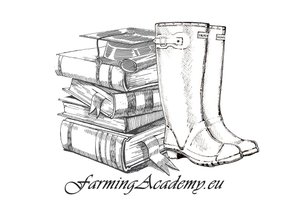FarmingAcademy has a special connection to Africa
FarmingAcademy and development countries
OUR MISSION
FarmingAcademy is an online platform that everybody can access via the internet. After signing up, which is free, everybody can see what courses and lectures are available. Students can network within the platform to form study groups and connect with and submit questions directly to educators.
The platform has a section dedicated to basic skills, which students of all ages and genders can access on-demand globally.
Students from developing countries can access any course as often as they wish, and we try to help them get donations to cover the costs. On the platform, there is no visible distinction between paying students and those who qualify for a free education, which forms an equal foundation for networking across geographical and cultural borders.
FarmingAcademy can conduct examinations and issue diplomas accordingly, and those will have the same foundation and value no matter where or who the student is based.
This project aims to provide a quality education that everybody can easily access. The education will focus on animal nutrition and health by learning about animals' basic needs for water and feed.
The aim is to understand animal physiology, animals' needs for specific nutrients, and which types of feed ingredients will fulfil the animal's basal needs. The goal is that after each individual watches and understands the content of several courses, they will be capable of making better choices regarding feeding their own livestock. The rationality behind the goal is that by better understanding that each animal has some basic needs for specific nutrients and the form of feed, animals will be more productive, and hopefully, the livestock owner will experience fewer health issues with the animals. As a bonus, there is less money on treating ill livestock and more productivity without extra labour.
Only by providing all the necessary nutrients for animal needs can the animal fulfil its potential for being productive. Oversupply of nutrients will hurt the animal's productivity as well, besides harming the environment as well. Also, undersupplying one nutrient means that all the remaining nutrients will also be in oversupply and thereby be wasted, which will also hurt the environment. Sever oversupply can cause toxicity as well, which can have a severe negative impact on animals' overall performance and can even cause mortality.
One animal requires more than 40 nutrients daily. So, if one nutrient is only supplied to reach the animal's need for that nutrient at 25%, many other nutrients will only be utilized at 25% as well. So, if all other nutrients are provided at 100% of the animal's need, they will still only be utilized at 25% and potentially be toxic as the oversupply is four times that the animal can utilize for all other nutrients.
Plants not only contain nutrients but also anti-nutritional factors (ANF). The reason the group is called anti-ANFs is that a group of chemicals harm the nutritional value of any feed ingredients. Plants have ANFs to protect them from being eaten by animals (and humans). ANFs cannot be avoided but must be managed by limiting the inclusion level of specific ingredients and/or processing. For some ANFs, the impact is partly livestock-specific and age-specific. The younger animals are more sensitive than older animals.
The platform will be equally accessible to any gender. The only limitation for anybody to access the platform will be access to either a smartphone or a computer. To a large degree, the lectures use pictures and less heavy amounts of text to make the information easy to digest for people with less ability to read the courses which this project will start to produce, and upload will be courses that are most relevant for small-scale producers and women. However, no course in relation to livestock will be aimed only at men or women. With the Danish background the people behind this application, their equality is not something that we ever talk about, because everybody is equal, not prefer one gender vs. other will be a topic for any lecture. Also, by having both a female and a male editor, both perspectives will be equal and balanced.
For the project's delivery, climate itself is not an issue. However, the impact of changing climate is something that will be covered in some of the lectures, like how to feed your animals during drought and how to preserve feed for periods of the year when there is not any and limited fresh feed to feed the animals. Feeding quality feed for livestock the whole year will be covered in several lectures.
WHAT OUR FARMERS SAY
Paul the farmer
Nigeria
“I can see great value in using FarmingAcademy to inspiration and get usefull education.”
Paul
- Nigerian cattlefarmer
Joel the student
“I get lots of information on FarmingAcademy, and I get answers for my quistions. When I watch a lecture, then I ask the instuctors and get the answers I need”
Joel
- Nigerian agricultural student
JJ the instructor
“FarmingAcademy and its instructors welcome you to our world and are gratefull if you let us in to yours”
Jeanette Johnsen
- FarmingAcademy
Are you an african farmer?
We are trying to get to know african farmers and their needs. We have made a survey that you can find here.
If you live and farm in a developming country you can apply for free education
Send an email to jj@farmingacademy.eu or cp@farmingacademy.eu and write about yourself and your needs.
Do you want to get more information about FarmingAcademy in Africa
You can send an email to jj@farmingacademy.eu or cp@farmingacademy.eu to get more information.
